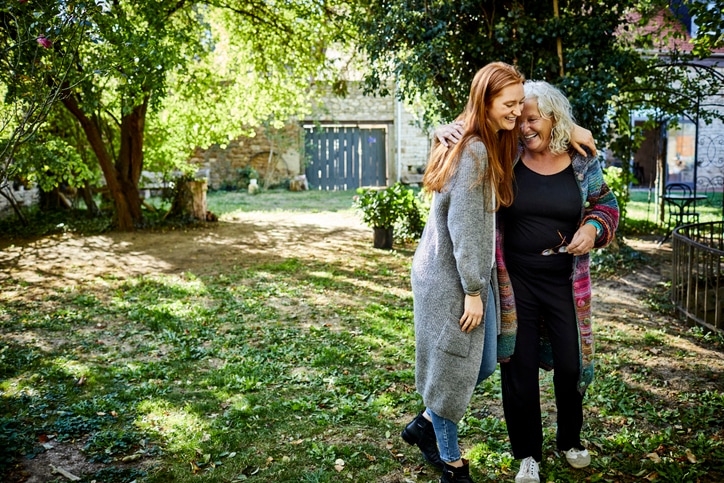Being a senior caregiver can be an incredibly rewarding career that gives you a sense of connection and purpose. But the job can come with physical challenges, and “it can [also] be overwhelming for caregivers to know that things will only get more difficult as someone ages and/or their level of needs increase,” says Michelle Saari, owner of Long Term Care RD and a registered dietitian with a master’s degree on senior nutrition.
Saari, who has spent much of her career in geriatric care and working in long-term care homes, has found that caregiving can be more stressful if you’re caring for an older adult who has certain types of medical conditions, such as cognitive impairment or dementia. As the condition progresses, Saari explains, it becomes harder for the senior to communicate their wants and needs — even basics, like if they’re hungry. “This can lead to [the senior having] outbursts of emotions and physical aggression, all of which lead to caregiver burnout,” Saari says.
Navigating the ups and downs of senior caregiving can be challenging, especially for newbies, but it’s more manageable with the right strategies in place. Below, Saari and other experts share 10 common missteps that can stress out senior caregivers and their clients — and how to course-correct so you’re both getting the most out of working together.
1. Allowing job creep
Private professional senior caregivers are at greater risk of job creep. This is when the scope of a position you’ve accepted grows beyond its intended role, points out Kelly Smith, a nurse of nearly 20 years who owns and operates a private duty nursing agency, Nestcare, in Sarasota, Florida.
Job creep — which tends to be more common if you work independently, as opposed to for an agency in a regulated state — can set in for various reasons, Smith says. For example, you may be asked to do additional tasks for a senior whose health is declining, such as helping with more cleaning, cooking meals more often or for other family members, or assisting with home care tasks like yard work or paying bills.
“They may also ask you to do things outside your scope of practice, such as fill their pill box or cut up pills, or draw up insulin or other medications,” Smith notes. However, job creep isn’t always due to worsening health; your client may simply become more dependent on you and increase your duties without extra time or pay, Smith adds.
It can be hard to push back, especially if you have an emotional bond with your client, but Smith warns that failing to address job creep can lead to feeling resentment and contempt.
To avoid this, she suggests having a written contract, or even a task list, outlining your responsibilities for each shift. “If a client or family member asks you to perform tasks outside the contract or task list, you can decline the task or negotiate payment for the extra work,” Smith says.
She also recommends documenting your daily tasks, noting any increased client needs or requests. You can use this as leverage for negotiation.
2. Not communicating effectively
Creating an environment of honest, open communication among caregivers, seniors and involved family members is the key to quality care, Saari says. It can also help the senior feel more involved and have a greater sense of control over their care, she adds.
Solid communication also sets the stage for a senior or family caregiver’s concerns to be addressed early, before problems worsen. For example, Saari says, if a caregiver or a family member notices the senior isn’t eating as much or is starting to lose weight, one party can flag the situation to the other and everyone can begin to brainstorm solutions. “It’s never too early to voice concerns and try to have these issues addressed,” Saari says.
To get ahead of problems or deal with issues head-on, Saari suggests proactively holding at least one monthly meeting with the senior and any involved family. She says it can be informal, but schedule it so it happens. “The point of the meeting is to ensure that the senior knows that there is a time where they can bring up any concerns or make the caregiver aware if there are any changes they would like to be made,” Saari explains.
“Being a caregiver for a senior means that you need to take care of yourself first. If you aren’t well rested, you’re constantly stressed out and you aren’t prioritizing your health, you won’t be able to properly care for anyone.”
— Michelle Saari, owner of Long Term Care RD
3. Getting burned out
Burnout, a form of intense stress and exhaustion, can take a toll mentally, emotionally, physically and spiritually, and because caregiving can be incredibly exhausting, the career path comes with a very high risk of burnout, points out Smith. Burnout risks are even higher for caregivers of patients with challenging conditions, such as those with cognitive or behavioral issues, like dementia.
Remember the oxygen mask adage? “Being a caregiver for a senior means that you need to take care of yourself first,” Saari says. “If you aren’t well rested, you’re constantly stressed out and you aren’t prioritizing your health, you won’t be able to properly care for anyone.”
It takes time to break out of burnout, so aim to proactively avoid it. One coping tactic is to seek balance. “I recommend ensuring that caring for a senior is a part of your life — not your entire life,” Saari explains. To put it in practice, avoid overcommitting at work. If you’re scheduled to work 40 hours per week, for example, try to stick to this and maintain boundaries with your time and energy, even if you feel guilty. Having firm boundaries leaves you more room to prioritize your health, happiness and relationships outside of work.
Smith recommends fighting burnout by looking for silver linings at work. “I know this can sound simple, but even writing down three positive experiences or activities/behaviors can help shift your brain into seeing more positives,” she explains. “You can also choose to write down three things that you feel good about the care you provided that day.”
Additionally, self-regulation and coping strategies can be combined with your work, Smith says. “This may look like taking a walk with the client late in the afternoon if they struggle with sundowners,” she suggests. “A walk can help clear your mind and keep you calm as you head into a time that may be difficult for them.”
4. Giving into power struggles
It’s incredibly common to find yourself in the midst of power struggles with your senior client, because as seniors age, they lose some independence and control — and will assert themselves to try and hang onto it, explains Smith.
While you may be tempted to engage, doing so can leave you feeling frustrated, irritated and possibly headed toward burnout, says Smith.
She’s found that most power struggles occur when the caregiver is ready to tackle a task, but the senior isn’t. In these situations, rather than digging your heels in, Smith recommends giving seniors a choice between two things that help accomplish the task while giving them a sense of control.
For example, Smith explains, say you tell the client it’s time for breakfast, and they respond that they’re not eating breakfast. “Instead of pushing back, try to offer a choice like, ‘Would you prefer eggs or yogurt for breakfast?’” Smith suggests.
Another way to deal: Step back and cool off. Say your client refuses their medication. “Instead of engaging in a power struggle and saying something like, ‘You have to take this medication, it’s time,’ try walking away for a few minutes and trying again a little later,” Smith offers.
5. Fearing asking for help
Don’t be ashamed if you realize the job has become too much for you. “For employers, the primary concern is that the best care is being given to a senior that needs help, and managing caregiver stress and physical abilities is incredibly important to maintain this,” Saari explains. That’s why, if you are a caregiver and feel that you are getting to your limit of helping someone, it’s important to bring these issues forward, she points out, adding that this could look like asking to work fewer hours or requesting that another caregiver assist you.
But when should you bring it up? Saari says it could be time to ask for assistance if the senior’s needs are increasing, such as losing the ability to lift themselves up, assist during tasks or feed themselves. That’s because it indicates “they are likely needing more care, more hours or assistance from you during caregiving tasks,” she adds.
You may also want to speak up if you think safety practices are being compromised — whether it’s because you’re not properly trained or the work is too taxing. For example, Saari says, there are specific ways to lift and transfer someone in a way that’s safe for the senior and the caregiver. “If you feel you are being put in a position where this is not possible by yourself, bring this forward.”
“Frequent time spent on your phone or doing personal tasks can make the client feel as if they are not a priority and that the caregiver is unprofessional. When paying a premium for in-home care, clients expect your full attention.”
— Kelly Smith, a nurse of nearly 20 years and owner of Nestcare
6. Doing tasks at random
Whether you’re assisting a senior with a bath or taking them to a doctor appointment, certain tasks can feel overwhelming, Smith says, but being strategic makes them more manageable. One tactic she suggests is scheduling tasks that take more time or are more frustrating for the client at a time of day they’ll best handle it. “For example, focus on bathing in the morning when the client is more relaxed and amenable rather than waiting until the afternoon when they are tired and more irritable,” Smith adds.
You’ll also do well to combine activities or tasks that can occur near each other — like cleaning the kitchen while the client eats lunch at the kitchen table, points out Smith. “This allows you to be near them and still provide care and companionship, while you have time to complete the tasks on your care list,” she explains.
7. Ignoring changes
Senior caregiving jobs are unique in how much they can evolve over time. After starting with a client with certain needs, they might develop mobility limitations or memory issues or require more personal or medical care.
Should you observe changes, know that you can — and should — speak up. If you see the senior more than their family, you might be more attuned and can call attention to smaller issues before they’re bigger problems. (This is also an opportunity to address related job creep!)
Smith recommends using the sandwich method for raising your observations. “This simply means that you discuss something good that they are doing first, then put your concern next, and finally wrap it up with a suggestion of how things can improve,” she explains.
Let’s say you have a client with new mobility issues. Smith offers this example of notifying the family using the sandwich method: “I have noticed Joe is interested in taking more walks and he looks forward to this each day. However, I have noticed that it can be difficult to navigate the uneven ground for him sometimes. Let me know if the doctor or physical therapist recommends a cane, walker or other assistive device so that I can best support his needs.”
She recommends caregivers don’t blame the client or family for any decline, but do broach the subject in a way that the family can take action. “This can help avoid a power struggle between the caregiver and the family member,” Smith notes. “You may also ask the family member if they have noticed the same concerns you have; this is an easy way to start an open dialogue.”
While some changes may be small with simple solutions, don’t hesitate to speak up about more significant changes, especially if you’re concerned the senior’s needs exceed (or will exceed) your capabilities. If you haven’t had adequate training for their new needs, it could endanger them, so communicate proactively and honestly if you think you’re no longer ideal for the job or could use further education like dementia training.
8. Being disorganized
Saari encourages anyone working in senior care to prioritize organization. That’s because after putting a system in place, you’ll not only ensure everything gets done, but your workload can feel lighter and less overwhelming.
Her favorite organization strategy is including all to-dos on a calendar, whether paper or digital. Each month, sit down and add every important meeting, appointment, assessment or other one-off event or task. Then, break it down weekly, writing that week’s tasks in order of priority. Saari does this knowing not everything will happen; less-important tasks are at the bottom of the list and can get pushed back a week if something pressing arises.
Lastly, zoom into the daily view and write down everything that needs to be done each day. Then, check them off as the day goes on to track your work, she says. There’s no one right way to get organized if another tactic serves you better; what matters is you set up a system to ensure nothing gets missed, Saari says,
9. Giving into distractions
It’s normal for anyone to occasionally get bored at work and seek ways to pass the time. But it’s not OK when it reduces your ability to provide care responsibly — especially for seniors who require careful monitoring.
The stakes of being distracted while caregiving are high; there’s significant data linking medical errors to distractions, Smith says. “When a caregiver is distracted, a client may be at a higher risk of a fall, of having a medication error, or of having an accident with kitchen safety or other home safety concerns,” she explains. That means when doing high-risk tasks, caregivers should especially strive to be fully present in the moment, Smith adds.
There’s also the personal impact: “Frequent time spent on your phone or doing personal tasks can make the client feel as if they are not a priority and that the caregiver is unprofessional,” Smith continues. “When paying a premium for in-home care, clients expect your full attention.”
You might consider putting it on do-not-disturb to quiet alerts, or using an app that locks access to specific apps during set hours. “If a caregiver is frequently distracted, they may need to make some changes to the plan of care and implement some specific activities which can engage the client, as well as improve connection between the caregiver and the client,” Smith says.
10. Having a negative outlook
Caregiving can take a toll physically, mentally and emotionally. If you let it get to you, you could end up with a negative outlook that makes you miserable and damages your client relationship.
For that reason, perspective is so important, Saari says, and when you get caught up in stress and moments of frustration, it’s easy to lose sight of the bigger picture. It’s not always easy, but she encourages senior caregivers struggling with a negative attitude to step back and remember that this isn’t just any job, but one of the most important jobs someone can do.
Ultimately, caregiving for a senior is an honor and a privilege. “Caring for someone in the last few years of their life should be taken as a wonderful opportunity to ensure they have the best remaining few years of their life,” Saari says.
“Some days this may take a mindset reframe to remember that you are an essential member of this person’s life, you are valuable, and even in the little mundane things — such as wiping down their equipment or helping them open packages — you are essential,” Saari adds. “Every little thing that you do makes a difference and can make their day a million times better, even if they aren’t able to vocalize that to you.”
The bottom line
Building a career as a professional senior caregiver takes a lot of hard work, and there can be a learning curve as you tackle new challenges and find your groove.
“There are many pieces to the puzzle, including increasingly complicated medical diagnoses, family dynamics, financial concerns, shortage of qualified caregivers and more,” Smith says. “However, it is so rewarding to be an integral part of the health and wellness of senior clients.” She points out how invaluable it is to seniors to have someone there to help them navigate the complex healthcare landscape.
When you keep these 10 things to avoid in mind, your job and client relationship can become more rewarding. As Smith concludes, “When caregivers are prepared for the challenges, the benefits to the client and caregiver easily outweigh the difficulties.”




